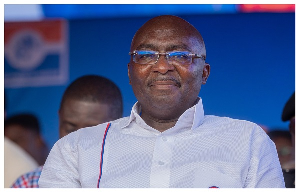Dr. Mahamudu Bawumia continued his constituency-focused nationwide campaign with intensive engagements in the Daboya-Mankarigu, Bole-Bamboi, and Sawla-Tuna-Kalba constituencies in the Savannah Region.
According to him, his campaign continues to be issues-based, focusing on his vision of building a modern Ghana anchored on a solid foundation of education, technology, and skills acquisition to take full advantage of the possibilities inherent in the 4th Industrial Revolution.
On one of the campaign grounds, Dr. Bawumia made this campaign promise.
“We will make mobile phones accessible. My government will partner with phone manufacturers so that Ghanaians can afford them on credit and pay 1 or 2 cedis every month.”
“Access to smartphones is no longer a luxury but a necessity. It opens up opportunities for education, business, and staying connected with loved ones. By making smartphones affordable, we are not only enhancing connectivity but also fostering an environment where every Ghanaian can thrive in the digital age,” Dr. Bawumia added.
I closely examine Dr. Bawumia's campaign promise to make mobile phones accessible through a credit system, with a monthly payment of 1 or 2 cedis.
While this initiative appears to be a step towards bridging the digital divide in Ghana, I question whether it is a genuine attempt to address the issue or simply a political gesture. A closer look at the proposal points out a lack of clarity on the underlying economic assumptions and the Vice President's vision for economic transformation.
On the surface, Dr. Bawumia's promise appears to align with the principles of digital inclusion, which focus on the importance of smartphones in modern life.
However, the devil lies in the details. By proposing a credit system with a monthly payment of 1 or 2 cedis, Dr. Bawumia implies that his government will not necessarily consider economic transformation to increase citizens' purchasing power. Instead, the focus seems to be on making smartphones accessible through debt financing.
If Dr. Bawumia's administration intends to transform the economy, why is he not promising to create an economic environment where citizens can afford smartphones without relying on credit? An economy characterized by success would typically lead to increased purchasing power, making smartphones more affordable for Ghanaians.
Obviously, the financing model proposed by Dr. Bawumia seems unrealistic, if not impractical. Mobile phone dealers operate on profit margins, and it is unlikely that they would be willing to sell their products on credit with monthly payments as low as 1 or 2 cedis. This amount is lower than the actual cost of the device, and it is unclear how the dealers would recoup their investment.
Dr. Bawumia's promise assumes that when he becomes Ghana's president, the economy will remain stagnant, and people will not have the disposable income to purchase mobile phones outright. This outlook is pessimistic. It is reasonable to expect that people's purchasing power will increase, making it easier for them to afford mobile phones without relying on credit financing.
However, it is also possible that Dr. Bawumia's statement was made to illustrate a point, rather than being a concrete policy proposal. He may have been speaking in a manner akin to a "class one teacher" to simplify the concept for his audience to grasp his message correctly.
Opinions of Tuesday, 23 July 2024
Columnist: Dickens Ofori Asare Adjei



















